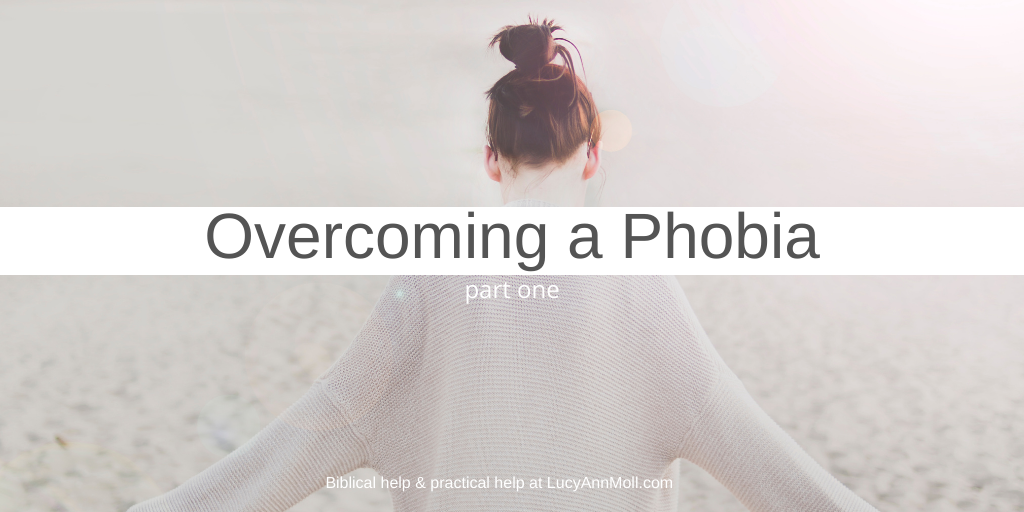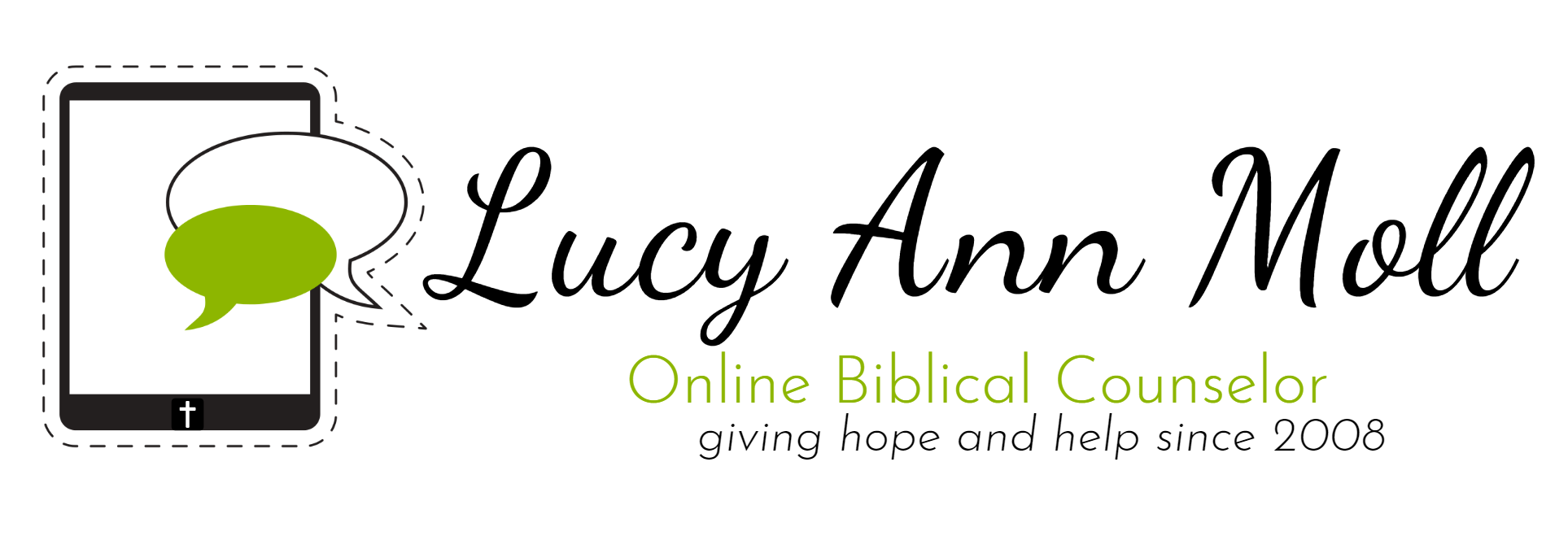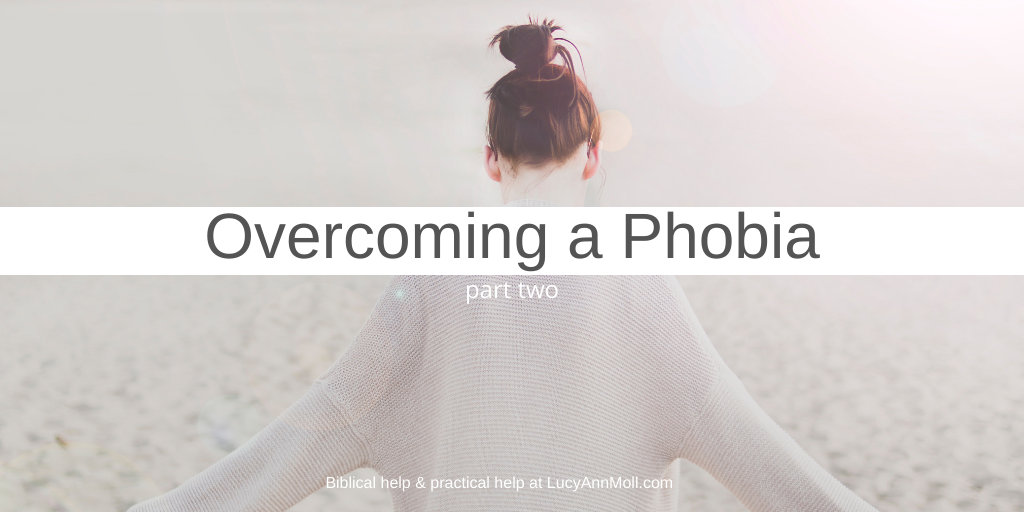
by Lucy | Jan 14, 2021 | biblical counseling
Did you know that nearly one in ten Americans have a phobia? (Check this out.)
Since the pandemic began, germs have been at the center of our national conversation. Now it is coupled with the political turmoil of our day. All the talk about COVID-19 has created anxiety in many people; and it’s no wonder—this microorganism that causes the disease is invisible, silent, and sometimes deadly.
The pandemic has targeted its terror on germaphobes, that is people who have germaphobia (also spelled germophobia). However, people with an intense fear of germs have a lot of company; there are millions of us who have a phobia of some sort.
Take courage. You can overcome a phobia.
We will consider the prevalence and type of phobias and their signs and symptoms in Part One of this two-part series and then discuss biblical solutions in Part Two. It appeared first here at the Biblical Counseling Coalition and has been updated.
Thousands of Phobias!
Germaphobia is one of many thousands of phobias. Here is a long list of them.
What they have in common is an intense, irrational fear of something that poses little or no actual danger. The word phobia comes from the Greek word “phobos,” which means fear or terror. For instance, hydrophobia literally means the fear of water, aerophobia is the fear of flying, and glossophobia is the fear of public speaking or of speaking in general.
In Scripture, phobos has two primary meanings: sometimes, it is positive and speaks of awe or respect, as in Acts 2:43, but usually, it refers to withdrawal from the Lord’s will. Here is an example of the latter: “They were terrified and asked each other, “Who is this? Even the wind and the waves obey him!” (Mark 4:41, NIV).
Types of Phobias
DSM-5, used by health professionals to describe and diagnose mental health conditions, lists phobias in categories: specific phobias, social anxiety disorder (formerly social phobias), and agoraphobia.
While DSM-5 describes phobias and other anxieties, it falls short in addressing the deepest needs of the human heart and soul. Therefore, counselors who desire to minister to the heart of people they counsel offer remedies that differ from the medical mainstream. As a biblical counselor, my goal is to point fellow strugglers to the changeless truth of God’s Word, which speaks to fear and how to handle it biblically, the topic of Part Two of this article.
Specific phobias zero in on one fear like the fear of germs. Other common specific phobias are fear of heights, elevators, dentists, and thunderstorms. The National Institute of Mental Health reported that 9.1 percent of U.S. adults had a specific phobia in the past year and that 12.5 percent of U.S. adults experience a specific phobia at some point in their lives.
Social anxiety disorder (formerly called social phobia) involves fear of embarrassment or humiliation in situations where you may be noticed or scrutinized. Common social phobias are fear of crowds, fear of spilling food while eating in public, and, of course, fear of public speaking.
Agoraphobia is the mother of all phobias, as it has been described as “the fear of fear.” Folks with this phobia often avoid grocery stores, movie theaters, restaurants, and public transportation. Approximately 0.9 percent of U.S. adults had agoraphobia in the past year, with the degree of their problem varying from mild (28.7%) to moderate (30.7%) to serious (40.6%).
Signs and Symptoms of a Phobia
Someone with a phobia may experience mild apprehension toward the feared object or situation or may have a full-blown panic attack. Bodily sensations of a phobia may include these:
- difficulty breathing
- a racing heart
- chest tightness
- perspiration
- trembling
- tingling in the hands and feet
- nausea.
Emotional effects of a phobia include fear of losing control or going crazy and feeling an intense need to escape. The more symptoms, the greater the fear and the greater the likelihood that panic attacks may develop.
I describe a specific phobia of highway driving that led to my experience of panic attacks in my mini-book Help! I Get Panic Attacks.
An Invitation
Are you sick of fear? If so please contact me for a complimentary phone consult to see if biblical counseling through Telehealth would help you. I’ve counseled women and their families by Telehealth and Skype since 2008 all over the world. I’d love to help you too. Biblical counseling by video is effective, affordable, and convenient.

by Lucy | Jul 16, 2020 | biblical counseling, emotions, relationships |
When we are under a lot of stress, our anger may bubble over and scorch someone. Then what?
We may think that we are justified in our anger and that the other person deserved our hot words or our icy stare. But Scripture provides a better way: confession leading to forgiveness. In other words: an apology!
Here is an article I wrote for the Biblical Counseling Coalition in the middle of the 2020 pandemic. I hope it helps!

Jack and Jill needed help in making an apology. Yes, they are living the American dream: steady employment, a nice home, two healthy children, and a marriage that has lasted eleven years. But there is a problem. But under his successful veneer, Jack becomes angry when he doesn’t get what he wants and lets his family know it, loudly. Jill also gets mad—a quiet simmering, stewing kind of anger that is just as nasty as her husband’s.[1]
Each has said and done things that, at the time, made sense in the heat of their anger. Their relational pain prompted them to make an appointment with a biblical counselor who showed them from Scripture that an angry heart is the cause of their conflict (Matt. 5:21-22; Mark 7:20-23; Luke 6:43-45; James 4:1-2; 1 John 3:15).
This was news to Jack and Jill, both Christians. He had figured that his upbringing was at fault for his anger problem and that his wife’s monthly hormonal swings had caused her irritation. As they were beginning to each take responsibility for their own sin, Jack and Jill needed to replace their old way of sweeping their anger under the rug, which had only created more problems (James 1:19-20).[2]
It is essential to relational healing for the wrongdoer to confess to the harmed party how he or she failed. We often call this “making an apology.” This blog post covers a sliver of forgiveness—specifically, seven parts of an apology, outlined by Ken Sande, author of The Peacemaker. Making an apology is an art that requires humility. But usually, we mumble a quick “I’m sorry” or say, “Let’s just forget it, okay?” These non-apologies rarely bring about true forgiveness and may deepen resentment.
So, what’s a better way? Consider “Seven A’s of Confession.”[3]
1. Address Everyone Included
First, confess your sin to God (Ps. 32:5; 41:4), then to every person who has been touched by it. Ken Sande differentiates between a “heart sin” and a “social sin.” “A “heart sin” takes place only in your thoughts and does not directly affect others. Therefore, it needs to be confessed only to God.”[4] But often, a sin is not only a heart sin but a social sin that is evident in our behavior. When Jill felt anger toward Jack, for example, she very rarely talked to him about it; instead, she became irritated and sniped at him and their children. In counseling, she learned of her need to confess the sin of grumbling to each of them and seek their forgiveness.
2. Avoid If, But, and Maybe
Using these words negates the confession, for it shifts the blame to others or minimizes guilt. The best example: “I’m sorry if I’ve done something to upset you.” Isn’t it amazing that the tiny word “if” ruins this frequent “confession”? It implies that the person does not know whether there was any wrongdoing in the first place.
Other examples of non-confessions:[5]
“I shouldn’t have gotten mad, but I was tired.”
“I know I was wrong, but so were you.”
3. Admit Specifically
The more detailed the apology, the better. Rather than saying, “I acted like a jerk yesterday,” you might say, “I’ve been taking out my frustrations on you. I have had a lot of stress caring for the kids, but this doesn’t give me an excuse to criticize you and nag you.”
When possible, identify how you violated God’s will. When you detail your wrong and focus on where you need to change, then the other person is more likely to respond positively to your apology.
4. Acknowledge the Hurt
Acknowledgment may rightly sound like, “I can only imagine that you felt fearful when I didn’t come home until late last night” or “I can only imagine that when you found a porn site in my search history, you felt deeply hurt and angry.” For an apology to be effective and meaningful, you must express sorrow. The sorrow must be genuine, of course: “For godly sorrow produces a repentance that leads to salvation without regret, whereas worldly grief produces death” (2 Cor. 7:10). People see through a fake confession, and it simply makes things worse (Prov. 6:16-19).
5. Accept the Consequences
Winston Smith relates a story of forgiveness granted easily to someone who had sideswiped his wife’s car and had left a note on the windshield, admitting wrongdoing and offering to pay for repairs. “After a few phone calls and a trip to the body shop, the car was repaired, and a check from the offender came in the mail. All was forgiven.”[6]This person acknowledged their wrongdoing and accepted the consequences.
We read examples of restitution in the Bible, too. A primary example is the chief tax collector, Zacchaeus, who had climbed a sycamore tree. What made his confession believable was his eagerness to pay back the people he had cheated. When he met Jesus, he declared that he’d give half of his possessions to the poor, and “if I have cheated anybody out of anything, I will pay back four times the amount” (Luke 19:8). The greater your willingness to repair the damage you may have caused, the more believable your confession.
6. Alter Your Behavior
In counseling, Jack and Jill came to understand that their anger arose from a selfish heart. Jack wanted peace and quiet; Jill desired comfort. Jack learned to repent of the evil desires that produced his anger and to receive God’s forgiving grace.[7] Likewise, Jill became aware that she was bitter toward her husband and turned to Jesus in repentance and faith.[8]
As they each confessed their sin to God and thanked Him for His forgiveness, they began to alter their behavior. One change they made was to speak the truth in love (Eph. 4:15). A second was to keep no record of wrongs (1 Cor. 13:5). A third was to listen well (James 1:19). Sande recommends a written plan that details the changes you plan to make because it “shows you take the matter seriously and are willing to spend substantial time planning how to change.”[9] He also suggests listing specific goals and objectives so that you have an objective way to measure progress toward the goal of making a heartfelt apology.
7. Ask for Forgiveness (and Allow Time)
Very often, if you’ve completed the previous six steps, when you ask, “Will you forgive me?” forgiveness will be granted readily. The question itself signals that you have completed the apology and that it is the other person’s turn to respond. While Scripture commands believers to forgive (Col. 3:13), sometimes granting forgiveness is difficult. It may take time, especially if the hurt is deep.
Sande makes this suggestion:
If you sense that the person to whom you confessed is simply not ready to forgive you, it may be helpful to say something like this: “I know I have deeply hurt you, and I can understand why you would have a hard time forgiving me. I hope that you will soon be able to forgive me, because I want very much to be reconciled. In the meantime, I will pray for you. I will do my best to repair the damage I caused as quickly as possible… If there is anything else I can do, please let me know.”[10]
If forgiveness is still slow in coming even after you’ve made this appeal, then you may need to go back over the previous six steps to make sure you’ve made a good apology. It is also possible that the other person doesn’t understand the biblical concept of forgiveness.[11] In this case, you may need to humbly provide the necessary information. Another option is to ask for help from a pastor or trusted Christian friend.
Of course, not every apology requires all of these steps. But if the hurt is deep or is a compilation of many lesser offenses, then using this template may prove wise. Do not let the steps themselves become a ritual, however, as had Sande. He confesses, “I have caught myself going through the Seven A’s simply to get a burden off my shoulders and minimize the consequences of my sin. In the process, I heaped greater burdens on the person I had already wronged.”[12]
Truly, making an apology is an art. As God opens your eyes to how you’ve hurt others, He’ll also give you the desire and the grace to seek forgiveness from Him and from the one you’ve offended. While many of us know what forgiveness is, it is always good to understand the parts of an effective apology. These seven steps will help you to avoid a wishy-washy apology and provide an expression of regret that leads to genuine forgiveness and reconciliation.
Questions for Reflection
- Which of these seven parts of an apology are either new to you or are difficult for you?
- Do you push the person you’ve offended to accept your apology right away? Why is this a wrong way of handling an apology?
[1] Robert D. Jones, Uprooting Anger: Biblical Help for a Common Problem (Phillipsburg, NJ: P&R Publishing Company, 2005), 13. Jones uses the fictitious story of Jack and Jill to help the reader understand biblical truth concerning anger. His book is among the very best on the topic.
[2] Ken Sande, The Peacemaker: A Biblical Guide to Resolving Personal Conflict, 3rd ed., Grand Rapids, MI: Baker Books, 2004, 136-137. Among the many compounding problems are reckless words, grumbling and complaining, lying, slander, malicious thoughts, stubbornness, vengeance, bitterness, defensiveness, and withholding mercy and forgiveness.
[3] Ibid., 126-133.
[4] Ibid., 127.
[5] Ibid., 128.
[6] J. Alasdair Groves and Winston T. Smith, Untangling Emotions (Wheaton, IL: Crossway, 2019), 204.
[7] Jones, Uprooting Anger, 148.
[8] Ibid., 149.
[9] Sande, The Peacemaker, 132.
[10] Ibid., 133.
[11] This blog post does not begin to cover all of what forgiveness is. One excellent resource I recommend is Unpacking Forgiveness: Biblical Answers for Complex Questions and Deep Wounds (Wheaton, IL: Crossway, 2008). Author Chris Brauns helps his readers understand when and how to forgive.
[12] Ibid., 133.











